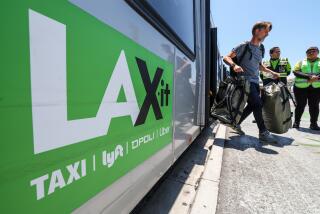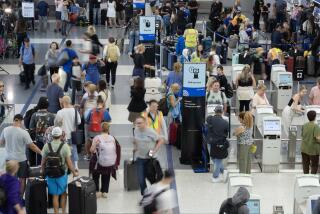American Airlines’ fast check-in device arrives at LAX
- Share via
At some grocery stores, cashiers open an extra checkout station when the lines get long.
Starting this week, when crowds gather at the American Airlines counters at Los Angeles International Airport, staffers may serve the waiting passengers with hand-held devices that print boarding passes and baggage tags.
The device, the size of a large cellphone, is attached to a small printer that hangs from the belts of the airline employees.
Several airlines already let passengers download an electronic boarding pass to a cellphone or PDA, but American Airlines says it has the only portable device in the U.S. that lets passengers skip the counter altogether even when they have bags to check.
The device, known as YADA — for Your Assistance Delivered Anywhere — will be used primarily when crowds get big because of weather delays or when international flights land and passengers need to make a quick connection, said American Airlines spokeswoman Stacey Frantz.
“YADA is not meant to replace what we have for our customers now,” she said.
The gadgets are already in use at airports in Albuquerque, Boston, Chicago, Dallas, Miami, New York, St. Louis and Puerto Rico.
Expand tarmac-delay rule, critics urge
A Virgin Atlantic flight that stranded 300 passengers for about four hours at a Connecticut airport last week has sparked calls from airline critics to expand new federal airline penalties to include foreign-based airlines.
The flight, scheduled to fly from London to New Jersey, was diverted to Bradley International Airport near Hartford because of bad weather. But the airport was not staffed around the clock to process foreign passengers, so the airline waited for U.S. Customs officials to arrive before letting the passengers off the plane.
The plane stayed on the tarmac from about 8:30 p.m. to 12:15 a.m. and power interruptions left it in intermittent darkness without air conditioning, according to passengers. The airline issued a statement apologizing for the inconvenience but declined to elaborate on the incident.
Under federal rules that took effect in April, airlines that strand passengers for more than three hours can be fined up to $27,500 per passenger. The U.S. Department of Transportation is investigating the Virgin Atlantic incident — but not under the new rules, which don’t apply to international flights or foreign carriers.
Several airline critics said the incident shows it is time to expand the rules to include foreign airlines — an idea the Department of Transportation is already considering.
“Numerous passengers were hospitalized after being exposed for over four hours to temperatures well over 100 degrees,” said Kate Hanni, founder of the Coalition for an Airline Passengers’ Bill of Rights. “We are fortunate there were no fatalities.”
Hotel review site shows the whole picture
Hotel brochures and websites are designed to depict their own lodgings as welcoming and attractive.
Elie Seidman, cofounder of the hotel-booking website Oyster.com knows that hotels don’t always give an honest portrayal of their property in such sales material.
Two years ago, he teamed with his brother Eytan and fellow entrepreneur Ariel Charytan to develop a website that publishes undoctored photos and hotel reviews by staffers and freelance reviewers.
Other websites, like Yelp and TripAdvisor, publish photos and reviews by hotel guests.
Here’s what sets Seidman’s website apart: It pokes fun at hotels that publish photos that don’t completely reflect reality. A section of the site called Photo Fakeouts shows side-by-side comparisons of hotels’ photos and those shot by Oyster’s staff.
For example, a photo from the website for Miami’s Aqua Hotel shows a young man emerging from a pool with a surfboard under his arm. In reality, the pool is not much bigger than a hot tub, according to a photo shot by Oyster. A hotel spokesman said the surfer photo was intended to highlight nearby ocean surfing and was not meant to mislead potential guests about the size of the pool.
And a photo of a rooftop pool from the website for the Sofitel hotel in Los Angeles was shot in a way that doesn’t give the whole story. The image by Oyster reveals the adjacent Beverly Center mall dominating the skyline.
Sofitel’s general manager, Gunther Zweimuller, defended the photo, calling it “an accurate image of the setting that our guests enjoy.... It has not been retouched or altered in any way.”
More to Read
Inside the business of entertainment
The Wide Shot brings you news, analysis and insights on everything from streaming wars to production — and what it all means for the future.
You may occasionally receive promotional content from the Los Angeles Times.










